|
Dolce far niente
![]()
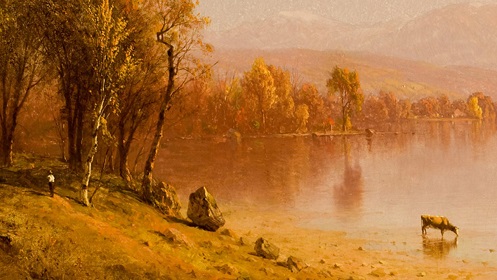
Indian Summer in the White Mountains door Sanford Gifford, 1862
An Indian Summer Day on the Prarie
(In The Beginning)
THE sun is a huntress young,
The sun is a red, red joy,
The sun is an indian girl,
Of the tribe of the Illinois.
(Mid-Morning)
The sun is a smouldering fire,
That creeps through the high gray plain,
And leaves not a bush of cloud
To blossom with flowers of rain.
(Noon)
The sun is a wounded deer,
That treads pale grass in the skies,
Shaking his golden horns,
Flashing his baleful eyes.
(Sunset)
The sun is an eagle old,
There in the windless west.
Atop of the spirit-cliffs
He builds him a crimson nest.
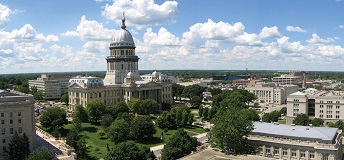
Vachel Lindsay (10 november 1879 - 5 december 1931)
Springfield. Vachel Lindsay werd geboren in Springfield.
De Canadese dichter en schrijver Philip Michael Ondaatje werd op 12 september 1943 geboren in Colombo, Ceylon (nu Sri Lanka). Zie ook mijn blog van 12 september 2010 en eveneens alle tags voor Michael Ondaantje op dit blog.
Uit: The English Patient
“At night he is never tired enough to sleep. She reads to him from whatever book she is able to find in the library downstairs. The candle flickers over the page and over the young nurse’s talking face, barely revealing at this hour the trees and vista that decorate the walls. He listens to her, swallowing her words like water.
If it is cold she moves carefully into the bed and lies beside him. She can place no weight upon him without giving him pain, not even her thin wrist.
Sometimes at two a.m. he is not yet asleep, his eyes open in the darkness.
He could smell the oasis before he saw it. The liquid in the air. The rustle of things. Palms and bridles. The banging of tin cans whose deep pitch revealed they were full of water.
They poured oil onto large pieces of soft cloth and placed them on him. He was anointed.
He could sense the one silent man who always remained beside him, the flavour of his breath when he bent down to unwrap him every twenty-four hours at nightfall, to examine his skin in the dark.
Unclothed he was once again the man naked beside the blazing aircraft. They spread the layers of grey felt over him. What great nation had found him, he wondered. What country invented such soft dates to be chewed by the man beside him and then passed from that mouth into his. During this time with these people, he could not remember where he was from. He could have been, for all he knew, the enemy he had been fighting from the air.
Later, at the hospital in Pisa, he thought he saw beside him the face that had come each night and chewed and softened the dates and passed them down into his mouth.
There was no colour during those nights. No speech or song. The Bedouin silenced themselves when he was awake. He was on an altar of hammock and he imagined in his vanity hundreds of them around him and there may have been just two who had found him, plucked the antlered hat of fire from his head. Those two he knew only by the taste of saliva that entered him along with the date or by the sound of their feet running.”
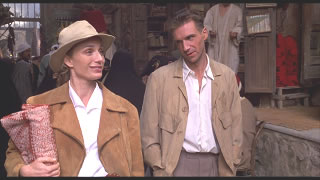
Michael Ondaatje (Colombo, 12 september 1943)
Juliette Binoche als Hana en Willem Dafoe als David Caravaggio in de gelijknamige film uit 1996
De Amerikaanse schrijver James Frey werd geboren op 12 september 1969 in Cleveland. Zie ook mijn blog van 12 september 2010 en eveneens alle tags voor James Frey op dit blog
Uit: Sky Key
« Chopra Residence, Gangtok, Sikkim, India
“Tarki, Tarki, Tarki . . .”
Clouds drift over the tips of the Himalayas, sun reflecting off the snow on their slopes. Kanchenjunga, the world’s 3rd highest peak, looms over Gangtok. The city’s residents go about their day—working, shopping, eating, drinking, teaching, learning, laughing, smiling. One hundred thousand peaceful, unknowing souls.
Little Alice struts across her home’s back lawn, blades of grass tickling her toes, the smell of a brushfire rising from the valley. Her fists are at her hips and her elbows jut behind her like wings. Her knees are bent, her head forward. She moves her elbows together, apart, together, apart, clacking and cawing like a peacock. She calls, “Tarki, Tarki, Tarki,” which is what they call the old peacock that’s lived with her family for the last 13 years. Tarki eyes the girl and does a half turn and ruffles his bright neck feathers and clacks back. His tail fans, and Little Alice dances with glee. She runs to Tarki. He takes off, Little Alice chasing.
The hard lines of Kanchenjunga are in the distance, hiding the Valley of Eternal Life below its frozen slopes, and keeping somewhere on its peak the five repositories of God.
Little Alice knows nothing of these, though her mother, Shari, knows the hidden valley intimately. One repository belongs to her line.
Little Alice follows Tarki to a rhododendron bush. She is less than a meter from the brilliant bird when he bows his head and blinks his eyes and scratches at something under the bush. The bird pushes into the leaves. Little Alice leans closer.
“What is it, Tarki?”
The bird pecks the dirt.
“What is it?”
The bird freezes like a statue, its head low but cocked, stares at the ground with one wide eye. Little Alice cranes forward. Something is there. Something small and round and dark.
The bird makes a horrible sound—Creeeeaaaaaak—and bolts toward the house. Little Alice is startled but doesn’t follow. She holds out her hands and pushes the waxy leaves aside and wriggles into the bush, kneels, puts her hands on the ground, finds.”
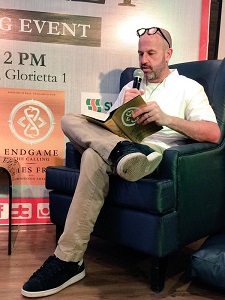
James Frey (Cleveland, 12 september 1969)
De Ierse dichter en schrijver Louis MacNeice werd geboren op 12 september 1907 in Belfast. Zie ook mijn blog van 12 september 2010 en eveneens alle tags voor Louis MacNeice op dit blog.
Wolves
I do not want to be reflective any more
Envying and despising unreflective things
Finding pathos in dogs and undeveloped handwriting
And young girls doing their hair and all the castles of sand
Flushed by the childrenæs bedtime, level with the shore.
The tide comes in and goes out again, I do not want
To be always stressing either its flux or its permanence,
I do not want to be a tragic or philosophic chorus
But to keep my eye only on the nearer future
And after that let the sea flow over us.
Come then all of you, come closer, form a circle,
Join hands and make believe that joined
Hands will keep away the wolves of water
Who howl along our coast. And be it assumed
That no one hears them among the talk and laughter.
Epilogue
Rows of books around me stand,
Fence me in on either hand;
Through that forest of dead words
I would hunt the living birds -
So I write these lines for you
Who have felt the death-wish too,
All the wires are cut, my friends
Live beyond the severed ends.

Louis MacNeice (12 september 1907 – 3 september 1963)
De Nederlandse dichteres en schrijfster Hannes Meinkema werd op 12 september 1943 geboren in Tiel. Zie ook mijn blog van 12 september 2010 en eveneens alle tags voor Hannes Meinkema op dit blog.
Uit:Twee vriendinnen
‘Hallo’, zegt ze, en verder even niets terwijl Beertje haar jas ophangt. Vandaag kordaat, zakelijk, snelle bewegingen met haar kleine lijfje (Ada voelt dus weer alle centimeters van haar te groot lichaam alle kanten opgaan).
Beertjes haar zit anders, achter haar oortjes gekamd. Iets te ordinair naar haar smaak. Een teleurstelling, denkt Ada.
‘Hoe vind je mijn haar?’ vraagt Beertje die ziet dat ze staat te kijken.
‘Een beetje ordinair.’ zegt Ada. Beertje en zij zeggen altijd alles tegen elkaar.
‘Ja hè, dat vind ik zelf nou ook.’ Helemaal niet agressief hoor of verdedigend of zo, maar gewoon kalm zegt ze dat. Teleurstelling maakt plaats voor bewondering. Ze zegt: ‘Wil je koffie?’ en loopt naar de keuken om het te zetten.
Nee, ze is niets van dat alles, voelt Ada. Beerje heeft zo'n bui waarin ze onbereikbaar is, waarin alle woorden en probeersels haar niet raken, dat weet ze van te voren, haar niet zullen raken maar daarentegen op korte afstand van haar huid tot stilstand zullen komen en onbeweeglijk blijven hangen. Ongetwijfeld, denkt Ada, zal ook deze morgen weer een vergeefse morgen zijn. Maar we maken er het beste van, verdomd, we geven de hoop niet op.
‘Zeg luister eens,’ zegt Beertje, ‘ik kom je eigenlijk iets vragen, of je iets voor me wilt doen.’
‘Wat je maar wilt,’ zegt ze terug, ze meent het nog ook, jawel, voor Beertje zou ze alles willen doen. Even merkt ze hoe haar gevoel van verstarring een beetje een klein beetje los gaat zitten, een puntje licht tussen haar ribben, zo van: misschien komt alles nog goed. ‘Wat is het?’ vraagt ze.
‘Nou, ik vind het echt een beetje lullig hoor, het lijkt wel of ik steeds van die karweitjes op je afschuif, maar ik heb het echt eerst zelf geprobeerd en het lukte gewoon niet.’
Ze weet het al, en valt Beertje in de rede (say no more, say no more): ‘Moet ik iets voor je verstellen soms?’
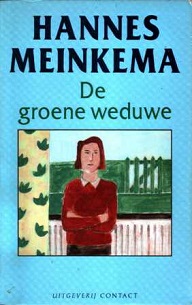
Hannes Meinkema (Tiel, 12 september 1943)
Cover
De Nederlandse columnist, journalist en schrijver Eduard Maurits Elias werd geboren in Amsterdam op 12 september 1900. Zie ook mijn blog van 12 september 2010 en eveneens alle tags voor Eduard Elias op dit blog.
Uit: Hendrik Hagenaars Hoek (Column)
“Wat of ik het liefste doe. behalve doelverdedigen, vraagt u? ‘Taartjes eten en mijn nagels laten manicuren, meneer Mulder. vooral slagroomtaartjes, vooral slagroomsoeten. die smaken zo heerlijk bij plomb!ère, weet u - u schrijft het toch op, meneer Mulder? Ik zou niet graag willen, dat dat niet in de krant kwam. Hebt u die slagroomsoezen, meneer Mulder? Bn verder ben ik dòl op appetite-sild, eau de cologme en ping-pong. Plngpong is zo uitmuntend voor de nieren, pingpong en een glas kummel, dan hoef je niet bang te zijn voor je nieren – zet u dat vooral in den kop van uw artikel, meneer Mulder en nu moet ik ml] verder aan mijn famille wijden, mijnheer Mulder. O ja, ik heb een schoonmoeder van 64 jaar, sinds 9 jaar weduwe, niet ongefortuneerd, inkomen pl. m. F 3200,-, is geboortlg ult Baardwijk, huwde reeds op vrij jeugdigen leeftijd met wijlen mijnn schoonvader en schonk hem zeven kinderen. het oudste is thans de 41-jarige heer Van der Loo, inspecteur van de rijkspisang centrale, gehuwd met een baronesse van Munnikhulzen.”
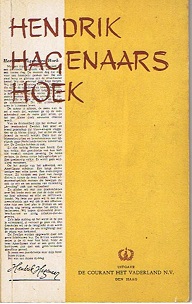
Eduard Elias (12 september 1900 — 14 januari 1967)
Cover
De Nederlandse dichter en hoogleraar Jan Willem (Wim) Schulte Nordholt werd geboren in Zwolle op 12 september 1920. Zie ook alle tags voor Jan Willem Schulte Nordholt op dit blog.
Kinderspel
Zij speelt vandaag een spel met andre namen:
Ik ben niet ik, maar ik ben die en die
en jij bent ook een ander. Op mijn knie
zit zij te praten, ik het te beamen
dat heel het leven maar toneelspel is.
Wij wonen in de trein of in de bomen
of soms in Amsterdam, en zij vergist
zich zelden in die duidelijke dromen.
Ook is zij vaak de moeder, ik het kind.
Dan laat zij mij haar platenboeken lezen
en kijkt of ik de dieren daarin ken.
O leven dat altijd opnieuw begint,
ik ben gelukkig weer een kind te wezen
en maar te zijn wie zij wil dat ik ben.
Italië
Het morgenlicht staat als een hand geheven
tussen de witte huizen van het plein
En door de ademende hemel zweven
vogels en dalen neer bij de fontein
van 't ruisende, onsterfelijke leven.
Wat zwarte kind'ren spelen bij het water
als eeuwen eerder. De verleden tijd,
Rome, de wereld, 't wordt in dit geklater
heden en toekomst, het wordt eeuwigheid.
Sta op, sta op en schrijd de morgen in.
Als marmer zult gij in het zonlicht blinken
schoon als een god, voorgoed aan het begin.
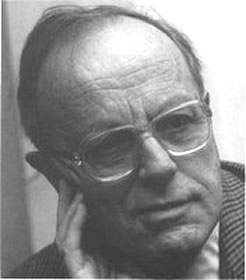
Jan Willem Schulte Nordholt (12 september 1920 - 16 augustus 1995)
Zie voor nog meer schrijvers van de 12e september ook mijn blog van 12 september 2015 deel 2.
|



